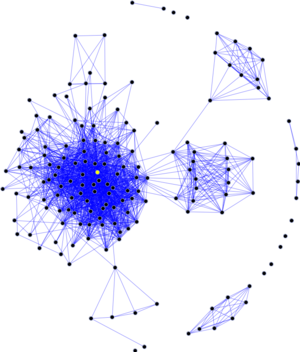I have been looking at
social constructivism and the social generation of knowledge over the last week. I am interested in this line of thought because I feel that for us to really get a handle on what
connectivism is, we have to be able to talk about it in the context of previous theories that talk about how we communicate and learn. Connectivism has to account for social constructivism because that is one of the prevailing theories about learning in the universities. According to
Stephen Downes, "connectivism is the thesis that knowledge is distributed across a network of connections, and therefore that learning consists of the ability to construct and traverse those networks." Connectivism, if you are not yet familiar with it, is a learning theory proposed by
Stephen Downes and
George Siemens. It is important to note that even though this is a new theory, it is not particularly dependent on any technology: connectivism was not invented by the internet. The internet was invented because we are very interested in communicating and being connected, and connectivism is a useful theory that can describe how this happens. When I say that connectvism is nothing new, I am not saying that in a derogatory way, I mean that it is the natural evolution of our understanding of how we learn. In various postings in this blog, I have pointed out how throughout history spontaneous learning networks have arisen between groups and individuals. I am interested in in the development of communication and knowledge networks from
the earliest mail routes to the "
Republic of Letters," from
the telegraph to
the early dial-up networks, from the
Minitel to
the modern internet. There is a lot of concern out there about whether or not
connectivism is a learning theory or not. I find this issue ironic and kind of amusing. Well, it is about learning, so that is settled. How can it not be a theory? According to Merriam-Webster, a theory is "an idea or set of ideas meant to explain facts or events" and "an idea that is suggested or presented as possibly true that is not known or proven to be true" and finally, the third definition "the general principles or ideas that relate to a subject." So yes, it is a theory, the real question is whether or not it is a strong or weak theory, or does it account for the facts? Can we make predictions with this theory? Does it explain what happened before? The irony is that the same mechanisms that educators are going to use test whether or not it is a useful theory are the same mechanisms connectivism describes, for instance, peer review.
Brent Renalli has in interesting paper called "
A Pre-history of Peer Review: Religious Blueprints from the Hartlib Cycle." In it, I ran into my old friend
John Cominus (1592-1670), the author of one of the first illustrated textbooks for children. He was also an early proponent of universal education, visual learning, and going beyond rote memorization in schools. All of these ideas, like connectivism, are still considered "new" and controversial in many universities - any instructional designer can tell you stories about that! I didn't go looking for Cominus, but in my research into education, I keep running into him. In a typical paper on peer review, authors tend to credit the Royal Society with its invention, but it was already a well-established system in Europe and elsewhere to ensure religious orthodoxy as a mechanism of censure. "Peer review" is generally not a good way to get new ideas out.
Connectivism has gone through its modern "Republic of Letters" stage via the blogs. Downes and Siemens both have used the blogs to write books, essays, and propose ideas. Educators in turn have responded for and against on their respective blogs - and continue to do so. And now, Siemens has published in a more formal and traditional manner with peer reviewed journals such as MERLOT's Journal of Online Learning and Teaching. Other education researchers are publishing articles about connectivism such as
Dorothy Kropf in the European Journal of Open, Distance, and Elearning. Thus far, the ideas around connectivism have had more exposure and peer review than Einstein's theory of relativity had in 1905 (the "
Annus Mirabilis" papers) when only Max Plank and Wilhelm Wien had read them before publication in
Annalen der Physik. I wonder if the theory of connectivism could have come out of the traditional institutions. I think these ideas had to have been born in the very media the theory analyzes. In many ways, the theory flies in the face of all the accepted theories in education (behavioralism, cognitivism, and the many shades of constructivism) and probably would not have gained traction. I have seen papers get rejected from journals because there are not enough researchers publishing about idea X in refereed journals. We have to expect that. Universities rarely innovate - that is left to the lonely patent clerks of the world. Universities are where ideas go to fossilize and become the established order. Connectivism needed the internet, blogs, and Twitter to take shape.


No comments:
Post a Comment